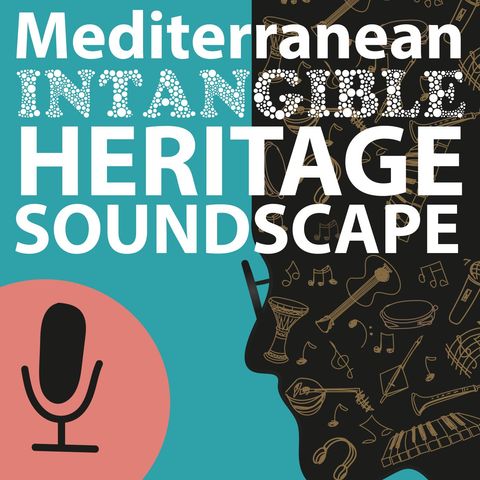
Contactos
Información
Poking around the Mediterranean, this podcast gives voice to researchers, scholars, performers, and artists who are digging through its rich intangible heritage with music and poetry always in mind. Paolo...
mostra másPaolo Scarnecchia, author of the podcast, in each episode meets experts, performers and artists who will present the musical traditions, passed down from generation to generation, and influenced by migrations, history and people all along the centuries in the Mediterranean region. In this journey, we will also explore how this heritage continues to evolve nowadays.
Mediterranean Intangible Heritage Soundscape is a podcast by Paolo Scarnecchia, produced by UNIMED, Mediterranean Universities Union. Musical works included in the Podcast are used for purpose of illustration for teaching, and not for commercial purposes.
About the Author
Paolo Scarnecchia is responsible for the UNIMED Music sector.
He has taught History of Music and History of non-European Music in many Italian conservatories, and has been Adjunct Professor at the University of Naples "L'Orientale", the Suor Orsola Benincasa University Institute of Naples, and Sapienza University of Rome.
He counts an active participation in international conferences, in Italy and abroad, on the musical culture of the Mediterranean region and in particular of the Near East. He has directed festivals and international music festivals and collaborated with several magazines.
He never stopped writing for Il Giornale della Musica and producing radio programs, dealing nowadays mainly with Early Music.
Among his publications it is worth to mention Popular music and cultured music - Enciclopedia del Mediterraneo, Jaca Book 2000 (also published in Spanish, French and Arabic).
About UNIMED
UNIMED - Mediterranean Universities Union - is a network of Higher Education and Research Institutions, founded in 1991, and active in promoting academic cooperation in the Euro-Mediterranean region and in Sub-Saharan Africa, in the Middle East and in Western Balkans. It counts more than 150 associated Universities coming from more than 20 countries.
Copyright
CC BY-NC-ND 4.0 DEED

Mediterranean Intangible Heritage Soundscape
Mediterranean Intangible Heritage Soundscape
The ma’lūf of Libya. A treasure to preserve.
Rural voices of Morocco across the Mediterranean echoes in Italy.
A tool to bring people together and make the world a better place.
Plain-chant, spiritualité et humanité. Nous sommes tous semblables. | II° Part
Plain-chant, spiritualité et humanité. Nous sommes tous semblables. | I° Part
La langue musicale du MAQÂM et ses éléments clés.
Longing and lost love. The Sevdah urban song of Sarajevo.
All is not lost. Aleppo's musical tradition in space and time.
Poking around the Mediterranean, this podcast gives voice to researchers, scholars, performers, and artists who are digging through its rich intangible heritage with music and poetry always in mind. Paolo...
mostra másPaolo Scarnecchia, author of the podcast, in each episode meets experts, performers and artists who will present the musical traditions, passed down from generation to generation, and influenced by migrations, history and people all along the centuries in the Mediterranean region. In this journey, we will also explore how this heritage continues to evolve nowadays.
Mediterranean Intangible Heritage Soundscape is a podcast by Paolo Scarnecchia, produced by UNIMED, Mediterranean Universities Union. Musical works included in the Podcast are used for purpose of illustration for teaching, and not for commercial purposes.
About the Author
Paolo Scarnecchia is responsible for the UNIMED Music sector.
He has taught History of Music and History of non-European Music in many Italian conservatories, and has been Adjunct Professor at the University of Naples "L'Orientale", the Suor Orsola Benincasa University Institute of Naples, and Sapienza University of Rome.
He counts an active participation in international conferences, in Italy and abroad, on the musical culture of the Mediterranean region and in particular of the Near East. He has directed festivals and international music festivals and collaborated with several magazines.
He never stopped writing for Il Giornale della Musica and producing radio programs, dealing nowadays mainly with Early Music.
Among his publications it is worth to mention Popular music and cultured music - Enciclopedia del Mediterraneo, Jaca Book 2000 (also published in Spanish, French and Arabic).
About UNIMED
UNIMED - Mediterranean Universities Union - is a network of Higher Education and Research Institutions, founded in 1991, and active in promoting academic cooperation in the Euro-Mediterranean region and in Sub-Saharan Africa, in the Middle East and in Western Balkans. It counts more than 150 associated Universities coming from more than 20 countries.
Copyright
CC BY-NC-ND 4.0 DEED
Información
| Autor | UNIMED |
| Organización | UNIMED |
| Categorías | Comentando la música , Cultura y sociedad , Educación |
| Página web | www.uni-med.net |
| unimed@uni-med.net |
Copyright 2024 - Spreaker Inc. an iHeartMedia Company
